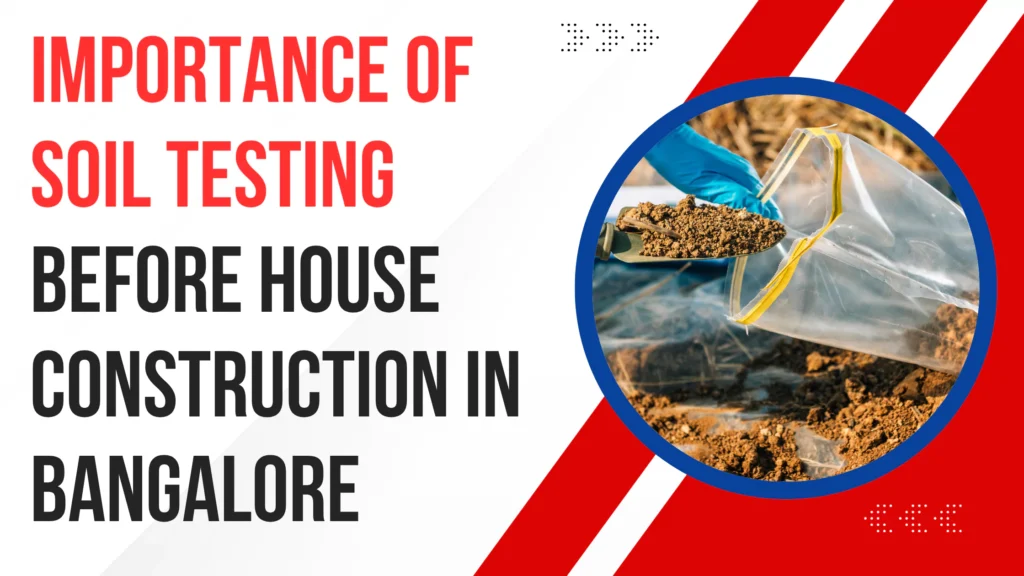
Importance of Soil Testing Before House Construction in Bangalore
You’ve bought a plot in Bangalore and are ready to build your dream home. Exciting, right? But before you dive into blueprints and contractors, there’s one crucial step you shouldn’t skip —Soil Testing Before House Construction in Bangalore.
You might think, “It’s just dirt, how complicated can it be?” Well, quite a bit! Bangalore’s landscape is as diverse as its culture — rocky in parts, clayey in others. One-size-fits-all doesn’t work when it comes to soil. Let’s explore why understanding your soil is the foundation (pun intended!) of building a safe, durable, and cost-effective home.
How is soil testing it done for house construction?
Soil testing is the process of analyzing the physical and chemical properties of the ground where a house construction structure will be built. The goal? To find out if the soil can safely support your house.
Sample Collection – Soil is extracted from various depths, typically 1.5 to 3 meters.
Lab Testing – Engineers test for moisture, density, strength, permeability, and other properties.
Analysis Report – Results guide decisions on the type of foundation, materials, and structural design.
Types of Soil Tests Conducted
- Moisture Content Test
- Measures how much water is in the soil. Too much moisture = unstable ground.
- Atterberg Limits Test
- Checks soil plasticity — how much it changes shape when wet or dry.
- Compaction Test
- Determines how dense the soil is when compacted — affects foundation stability.
- California Bearing Ratio (CBR)
Measures load-bearing capacity. Higher CBR = stronger support.
- Sieve Analysis
- Assesses particle size, important for drainage and structure.
- Chemical Composition Test
- Identifies corrosive elements like salts, which can damage concrete and steel.
Soil Types Found in Bangalore
- Red Laterite Soil
Common in outer Bangalore. Drains well but may lack strength unless treated. - Clayey Soil
Found in low-lying areas. Expands and contracts — risky if not stabilized. - Rocky and Mixed Terrain
Hilly parts like Kanakapura Road have granitic and mixed soils. Good for heavy structures but tricky to excavate.
Why Soil Testing is Crucial Before House Construction in Bangalore
- Foundation Design and Stability
Different soils need different foundations. Testing tells your engineer what’s best — raft, pile, or strip. - Load-Bearing Capacity
Knowing how much weight your soil can handle prevents unexpected sagging or collapse. - Preventing Structural Failures
Skimping on soil analysis can lead to cracks, leaks, and even total failure. Don’t gamble! - Estimating Cost and Materials
Soil reports help avoid over-engineering. Why pay for extra steel if you don’t need it?
Role of Soil Engineers and Geotechnical Experts
- Uneven Settlement and Cracks
Your walls and floors might shift unevenly, causing cracks and instability. - Costly Repairs
Fixing foundation problems later can cost more than the entire soil test. - Safety Hazards
Unstable structures are dangerous for your family and neighbours.
- Interpreting Results
You can’t just Google the report and hope for the best. A soil engineer tells you what it all means. - Recommending Foundation Types
Based on tests, they suggest appropriate foundation systems — slab-on-grade, mat, deep pile, etc.
Legal and Regulatory Aspects of house construction in Bangalore
- BBMP and BDA Guidelines
The BBMP and BDA require soil testing reports for construction approvals, especially for multistorey buildings. - Building Permit Requirements
Many contractors won’t even begin work without a soil test report.
Cost of Soil Testing in Bangalore
Factors Affecting Cost
Plot size
Number of tests needed
Soil depth and type
Average Price Range
₹7,000 to ₹25,000 for standard residential plots. A small price to avoid big headaches.
When Should You Conduct Soil Testing?
- Ideal Time for Testing
Before architectural planning starts, that way, you can tweak the design as needed.
- Turnaround Time
Most labs take 5–10 working days to deliver a detailed report.
Choose a Soil Testing Lab in Bangalore
Certifications to Look For
NABL Certification
ISO Accreditation
Local Reputation
Check Google reviews, or ask your architect for recommendations.
Real-Life Case Studies in Bangalore
Case 1: Cracked Dream Home in Whitefield
A home was built without soil testing. Within two years, foundation cracks appeared due to clayey soil expansion.
Case 2: Successful Build in Yelahanka
The builder did a complete geotech study. The site had rocky terrain — they chose a pile foundation. No issues 5 years later.
Tips for House Builders in bangalore
Always ask for the soil report before finalizing your architect’s plan.
If results are unclear, get a second opinion.
Use local engineers who understand Bangalore’s soil zones.
Conclusion
Building a house is a lifelong investment — and every strong home starts from the ground up, literally. In a city like Bangalore, where soil types vary dramatically from one area to another, soil testing isn’t optional — it’s essential.
Don’t let something as basic as dirt ruin your dream home. Be informed, test your soil, and build with confidence.
FAQ
House Construction Before Soil Testing in Bangalore
Yes, especially in areas with known weak or variable soils.
Absolutely! It can tell you about the water table level and drainage problems.
Usually 1.5 to 3 meters deep, depending on the number of storeys planned.
Soil testing is about ground quality; site survey is about plot boundaries and topography.
If construction is delayed by more than 6–12 months, or major weather changes occurred, a retest is wise.





